Lessons in Coping with Life from Swami Vivekananda
There is a growing concern about the many challenges of youth because right now and possibly in a few years hereafter, India will be the country with the largest percentage of youth. It is well known that around the age of adolescence, young men and women face psychological problems. In addition, there is the growing responsibility placed on their young shoulders by the passing away of the elders in the family. There is the career development urge to acquire financial stability, a partner in life, and a respectable status in society. They look for guidance and a role model.
Problems are like the hurdles in an obstacle race. The obstacle race would not be the least interesting but for these hurdles. If you remove the hurdles, what justifies the name obstacle race? And yet the hurdles are present not for the competitor to stumble and get injured. These obstacles are there for one to overcome.
Just imagine the super-cyclone of Orissa which ransacked the area in a matter of a few hours. Trees were uprooted, but not all of the trees. Those trees, whose roots were deeply spread in the ground below, stood the force of the cyclone. So too, if we are deeply rooted in the divine consciousness we may be tossed about but never uprooted. We use the term ‘divine consciousness’ because human perception in this matter is varied.
We shall recall the life of a young man, Narendranath Datta, whose entire life was one of unending problems and solving them with wisdom, patience and strength. While reading this narration, we invite the reader to pause, reflect and answer whether he/she had ever to face such mountainous problems!
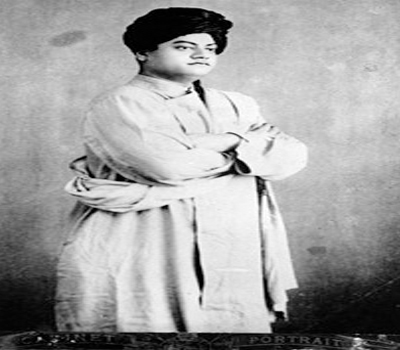
Meeting Sri Ramakrishna
Born on 12th January 1863, Swami Vivekananda was like any lad of his age, running about in the streets of Calcutta, mixing with friends, and smearing his body and clothes with the dust on the streets. He was a member of the Brahmo Samaj when he came to Dakshineswar to see the ‘Paramahamsa’ who had experienced ecstasy. Endowed with a resonant voice and a deep knowledge in music, Narendranath charmed Ramakrishna by singing a few songs as a proxy singer at the house of Sri Surendranath Mitra. As usual Ramakrishna wanted Narendranath also to visit him at Dakshineswar. The first few meetings between this future leader of the band of monastic disciples and Ramakrishna at Dakshineswar show that Narendranath had been chosen for a specific mission—the removal of the miseries of humanity, not merely of India but of the whole world.
Resolving An Ideological Conflict
Being a member of the Brahmo Samaj, Narendranath [or Naren, for short] had declared that he would not worship gods and goddesses in images or salute their images. Therefore, he could not accept the image of Bhavatarini at the temple of Dakshineswar. Ramakrishna, who had visualised the image of Bhavatarini as an ‘image of consciousness’ and not as a mere image of stone, was now up against bringing home this realisation to his favourite disciple. Several family problems faced by Naren forced him to ask Ramakrishna to speak to his Divine Mother on his behalf so that his family could have at least coarse clothing and simple food. Ramakrishna suggested Naren to pray to the Divine Mother directly and not through any intermediary. Thrice did Naren stand before the image in the temple, and thrice being in front of the living presence of the Divine Mother, he could only ask for jnana, bhakti, viveka and vairagya. That direct experience, again, is the story of Naren’s acceptance of the Divine Mother as a living presence in the image. Naren sang all night, ‘ma tvam hi tara’. Writing on this transformation, Swami Vivekananda said,
‘And then I, too, had to accept Her! No, the thing that made me do it is a secret that will die with me. I had great misfortunes at the time. . . . It was an opportunity.… She made a slave of me. Those were the very words: ‘a slave of you’. And Ramakrishna Paramahamsa made me over to Her.1
Naren’s Family Circumstances
Sri Durgacharan Datta, the grand-father of Naren, had left the household to take to a life of renunciation. His son Vishwanath Datta was raised by his mother, enduring the constant enmity, hostility, and selfishness of her husband’s family. She too died when Vishwanath Datta was about 12 years old and Vishwanath had to stand on his own feet. Now an orphan, he grew up in the family of his uncle Kaliprasad, who usurped much of Vishwanath’s rightful property. Vishwanath earned money being a famous attorney. To earn money, live amply, and make others happy by practising charity as far as possible — these were the characteristics of Vishwanath.
Relatives turned into enemies. They even deprived the family of their ancestral house. On some far-fetched basis a case was made out against them, and the matter taken to court. The case was finally decided in favour of Narendranath’s family, and they secured their legal share in the property. However, for several years it was a struggle for them to obtain the coarsest food and clothing. Disputes had started while Vishwanath was living, and his family had been staying in a rented house since then. Vishwanath suddenly died when Naren was just 21 years old. The stark truth of debts galore, due to the spending spree of his father, dawned on Naren when debtors all around started urging Naren to clear up the dues.
Narendra, the eldest of the sons of Vishwanath Datta, had to bear the burden of maintaining a family; he was fairly well educated but could not get a job. His friends, who once would be happy to spend their time with him, now deserted him. There were some who made the ugly proposal of a marriage alliance so that Naren could be financially better off. The very suggestion was highly disgusting to Naren.
Naren was pained at heart till the last days of his mortal existence: ‘I have sadly neglected my mother. … Now my last desire is to serve my mother, for some years at least. I want to live with my mother.’ Sometime later, Swamiji took a loan of five thousand rupees and purchased a house from his aunt, who cheated him outright by refusing to hand over the legal title deed!
Swamiji left America on 26 July 1900, and eventually returned to India in shattered health due to diabetes, dropsy and asthma, the sight in his right eye almost gone. In spite of that, he never abandoned any duty which he considered sacred. He continued to visit his mother and tried to alleviate her economic troubles and solve her family affairs as best he could.
Swamiji continued to strain his utmost to settle the court case over a property dispute that had begun when he was just fourteen years old! He went to his mother’s residence on 19 June l902, gave an additional thousand rupees to the opposing party, and settled it. On 2 July, two days before his demise, Swamiji gave an additional four hundred rupees to settle the case. His mother was sixty-one years old when Swamiji left his body.
It was his mother’s dearest wish to go on a long pilgrimage with Swamiji, and, in spite of his bad health, Swamiji long nurtured this desire to fulfil her wish as well as a strong desire that they should spend their last days together. Finally, he arranged to take his mother and other relatives on a pilgrimage to Dacca and Chandranath in East Bengal and Kamakhya in Assam, accompanying them in each place.
Spreading the Message of His Master
Ramakrishna had picked for himself an ideally suited bearer of his message for the yuga and told Narendra later on that there was a stage higher than even Samadhi, which Naren was to declare to the rest of the world: jo kuch hai so tu hi hai, and, therefore, serve all existence in the spirit of worship of God: that God can be meditated upon with eyes closed as with eyes open; that god may be worshipped in humanity as much as in images, that stars do exist even during the day when the brilliance of the sun makes it appear as if the stars did not exist. It meant that spiritual life was a two-pronged flight: inwardly, through internal concentration, to be aware of the Truth within, and, outwardly, through external concentration, to be aware—through service to humanity in the spirit of worship— of the Truth underlying the external world. Thus Samadhi was just half the story; the other half, expressed as ‘Siva jnane jiva seva’ [serve jiva as shiva], was equally important. This combined approach was the method of this Age.
Before his mahasamadhi, Ramakrishna had entrusted him with a mission, ‘Naren will teach others, both within and outside the country’. Not only was Ramakrishna’s mahasamadhi a second terrible blow, but a heavy load was placed on his shoulders to keep his brother disciples together and spread the message: shiva jnane jiva seva, harmony of yogas and religions; and to this Naren added tyaga and seva as the ideal of the individual and the nation, religion as the backbone of the country, and as the mission of the country in the harmony of nations. Naren felt the need to awaken the masses of India to the realization of the national spiritual heritage and to the vision of India as the queen of all nations seated on her eternal throne, more rejuvenated than ever before. He was the patriot saint of national awakening and pointed out that the degradation was far worse, consequent to the rule of the Muslims and British, the tyranny of the privileged classes over the masses, and the neglect of women.
His travels through India made him realise that religion was not at fault for the nation lying prostrate under a foreign rule but that it was want of practical application of Vedanta. His travels in the West made him understand that the Vedantic religion would withstand the sledge hammer blows of science and technology and give a foundation for the western thoughts of utility and humanitarian service, without which basis the whole of the western nation was standing on a volcano which may erupt at any time.
His travels in India and abroad made him realize two things: 1) that education was the panacea for all social evils, and 2) that Indians needed to perform organized work like they do in the West.
The Problems Swamiji Faced In America
In Madras Swamiji’s inherent potential was recognised and Swamiji was urged to proceed to the Parliament of Religions as a representative of Hinduism. A very big responsibility was being placed on too young a shoulder by a group of dedicated people, highly emotional but not conversant with the methods to be adopted. The disciples had not envisaged that Swamiji would be needing credentials for participation in the Parliament. They did not know several other things: that the last day for registering as a delegate to the Parliament was long over; that one had to wait long before the Parliament commenced; that the cost of living in the West was exorbitant; severe climatic conditions in winter at Chicago for which Swamiji did not have adequate clothes or funds to handle.
Swamiji too did not know what he would say at the Parliament nor had he a prepared speech. Also Swamiji had no idea of the value of money and was cheated right and left. As a contrast to Indian conditions, begging was not allowed in the West. It was divinely planned that Swami Vivekananda even under such circumstances was allowed to participate in the Parliament of Religions and that he became a celebrity overnight.
Swami Vivekananda always depended on the divine will. In a letter to Alasinga dated 20th August 1893 Swamiji wrote: ‘First I will try in America; and if I fail, try in England; if I fail, go back to India and wait for further commands from High.’2 That was before the Parliament commenced.
In a letter to Prof Wright, addressing him as Adhyapakji, Swamiji wrote on 8th October 1893, after the commencement of the historic Parliament:
. . .All my life I have been taking every circumstance as coming from Him and calmly adapting myself to it. At first in America I was almost out of my water. I was afraid I would have to give up the accustomed way of being guided by the Lord and cater for myself—and what a horrid piece of mischief and ingratitude was that. I now clearly see that He who was guiding me on the snow tops of the Himalayas and the burning plains of India is here to help me and guide me. . . . So I have calmly fallen into my old ways. Somebody or other gives me a shelter and food, somebody or other comes to ask me to speak about Him, and I know He sends them and mine is to obey. And then He is supplying my necessities, and His will be done! ‘He who rests in Me and gives up all other self-assertion and struggles I carry to him whatever he needs’. So it is in Asia. So in Europe. So in America. So in the deserts of India. So in the rush of business in America. For is He not here also? And if He does not, I only would take for granted that He wants that I should lay aside this three minutes’ body of clay—and hope to lay it down gladly.3
Variety of Experiences
Following the Parliament of Religions, there was an invitation from the Slayton Lyceum Lecture Bureau for Swamiji to make a tour of America. He lectured in most of the larger cities of the eastern, mid-western, and southern states, including Chicago, Iowa City, Des Moines, Memphis, Indianapolis, Minneapolis, Madison, Detroit, Hartford, Buffalo, Boston, Cambridge, Baltimore, Washington, Brooklyn and New York. When he began to give lectures, people offered him money, $30 to 80, for the work he hoped to do in India. He had no purse. So he used to tie it up in a handkerchief and bring it to his place of residence. He had to learn the different coins and to stack them up neatly and count them.
Swamiji was such a dynamic and attractive personality that many women made every effort by flattery to gain his interest. He was young and, in spite of his great spirituality and his brilliance of mind, was very unworldly. True, Swamiji often slept in India under a banyan tree with just a bowl of rice given by a kindly peasant. But he was sometimes the guest in the palace of a Maharajah and a slave girl was appointed to wave a peacock feather fan over him all night long. He did not allow such circumstances to tempt him.
Interesting Interactions
Swamiji exhibited tremendous mental powers during his interaction with three notable people. He was surprised by the words of Robert Ingersoll expressing the intolerant attitude of Americans: ‘Fifty years ago you would have been hanged if you had come to preach in this country, or you would have been burned alive. You would have been stoned out of the villages if you had come even much later!’ Ingersoll who believed in ‘making the most out of this world, in squeezing the orange dry, because this world is all we are sure of’ was told of ‘a better way to squeeze the orange of this world’ which gets one more out of the world. ‘I know I cannot die, so I am not in a hurry. I know that there is no fear, so I enjoy the squeezing. I have no duty, no bondage of wife and children and property; and so I can love all men and women. Everyone is God to me. Think of the joy of loving man as God! Squeeze your orange this way and get ten thousandfold more out of it. Get every single!’
John. D. Rockefeller, a fabulously wealthy American financier was yet another. Rockefeller was then not yet at the peak of his fortune, but was already powerful and strongwilled, very difficult to handle and a hard man to advise. One day, pushed to it by an impulse, he went directly to the house of his friend, brushing aside the butler who opened the door, saying that he wanted to see the Hindu monk. The butler ushered him into the living room. After a while, Swamiji told Rockefeller much of his past that was not known to any but himself, and made him understand that he was only a conduit for utilising the money he had already accumulated, and that his duty was to help and do good to people. Rockefeller was terribly annoyed. About a week after, again without being announced, he entered Swamiji’s study, threw on his desk a paper which told of his plans to donate an enormous sum of money toward the financing of a public institution. ‘Well, there you are,’ he said. ‘You must be satisfied now, and you can thank me for it.’ Swamiji didn’t even lift his eyes. Then taking the paper, he quietly read it, saying: ‘It is for you to thank me.’ Had not Swamiji made Rockefeller expand his consciousness to see himself in others as well? This was Rockefeller’s first donation to the public welfare.
He was always aware that a great power was working in and through him. ‘Wherever the seed of his Master’s power will fall,’ Swamiji wrote to his brother monks, ‘there it will fructify, be it today, or in a hundred years.’ ‘I am amazed at His grace’, he wrote again to them: ‘Whatever town I visit, it is in an uproar. They have named me ‘the cyclonic Hindu’. Remember it is His will—I am a voice without a form.’
(To be continued. . .)
References:
- CW, VIII, p. 263
- CW, 5, p.19
- CW, 7, pp. 453-54
Love knows no rival, for in it is always embodied the lover’s highest ideal. True love never comes until the object of our love becomes to us our highest ideal. It may be that in many cases human love is misdirected and misplaced, but to the person who loves, the thing he loves is always his own highest idea. One may see his ideal in the vilest of beings, and another in the highest of beings; nevertheless, in every case it is the ideal alone that can be truly and intensely loved. The highest ideal of every man is called God. Ignorant or wise, saint or sinner, man or woman, educated or uneducated, cultivated or uncultivated, to every human being the highest ideal is God. The synthesis of all the highest ideals of beauty, of sublimity, and of power gives us the completest conception of the loving and lovable God.
These ideals exist in some shape or other in every mind naturally; they form a part and parcel of all our minds. All the active manifestations of human nature are struggles of those ideals to become realised in practical life. All the various movements that we see around us in society are caused by the various ideals in various souls trying to come out and become concretised; what is inside presses on to come outside. This perennially dominant influence of the ideal is the one force, the one motive power, that may be seen to be constantly working in the midst of mankind.
—Swami Vivekananda
Source : Vedanta Kesari, June, 2016

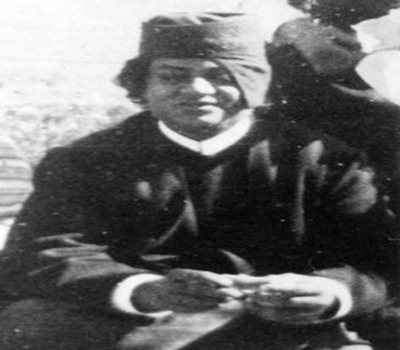
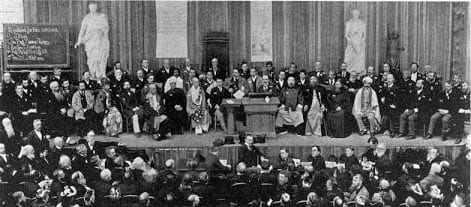
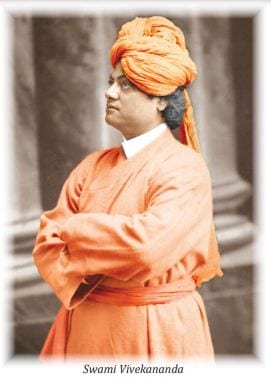
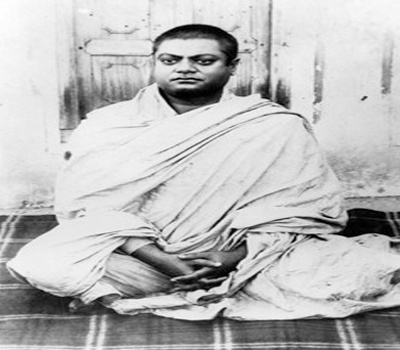

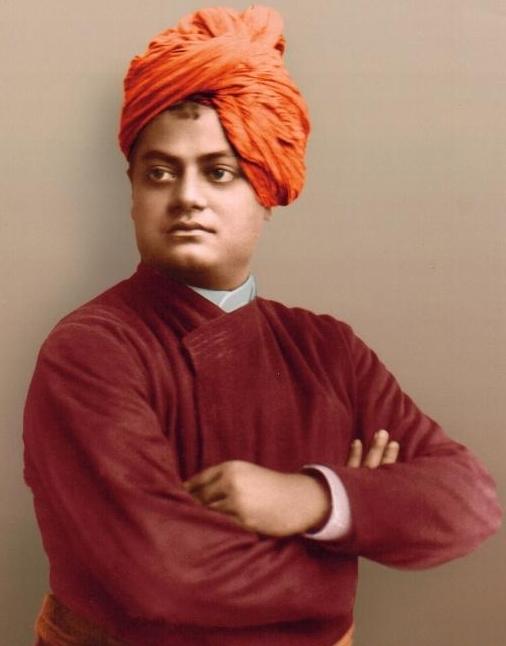
Leave A Comment